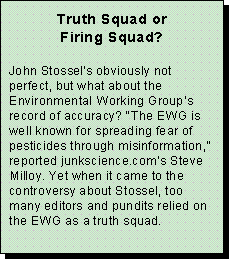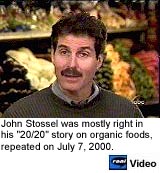 |
||||||||||||||||||||||||
|
||||||||||||||||||||||||
 |
||||||
|
||||||
 |
||||||||||||||||||
|
||||||||||||||||||
 |
|||||||||
|
 |
||||||||||||||||||||||||
|
||||||||||||||||||||||||
 |
||||||||||||||||||||||||
|
||||||||||||||||||||||||
|
What The Media Tell
Americans About Free Enterprise 
Media Aid Environmental Hit Job on ABC Reporter It makes complete sense that the Environmental Working Group (EWG) would attack ABCís John Stossel. After all, the 20/20 reporter spends most of his time investigating issues that his liberal-minded colleagues never seem to get around to, and his reports often bring to light facts that embarrass pro-government, pro-regulation activists who otherwise wouldnít have to deal with pesky reporters asking skeptical questions. But itís a different issue with Stosselís media brethren. Allegedly mainstream news organizations revealed their true mindset when they chose to repeat the EWGís distorted claim that Stossel is a sloppy and biased reporter, rather than hunt down the facts for themselves.
The Environmental Working Group, a factory for studies about the evils of pesticides and other chemicals, pounced on Stosselís mistake. Showing that they disapprove of all mistakes, the EWG declared the error "a serious breach of journalistic ethics," and demanded that the reporter be fired. No one paid much attention to the EWGís demand until the New York Times on July 31 ran a relatively brief item by media reporter Jim Rutenberg that leaned heavily on the environmentalistsí anti-Stossel spin. Explaining Stosselís comment about pesticide residue, Rutenberg, who credited the EWG with exposing the mistake, wrote that "ABC executives are now looking into whether the statement about produce, a key premise on which Mr. Stossel built his case, was made without any basis in fact."
Actually, Stosselís report was well-crafted, and correct in all of its key assertions. MediaNomics went to the videotape, and found that the wrong comments about pesticides were just two sentences in a report that lasted nearly ten minutes. Stosselís main point -- that consumers are buying expensive organic foods because they mistakenly believe they are more nutritious -- was amply documented and hasnít been contradicted by any of his critics. Do consumers think that organic produce is more nutritious? In his report, Stossel quoted several food shoppers testifying to their belief that organic produce is superior to conventional produce, including one man who insisted "I know it has more nutrients, which is what Iím interested in getting when I eat food." To bolster this anecdotal evidence, Stossel presented a scientific poll conducted by ABC that showed that nearly half (45%) of consumers say they believe organic foods are "more nutritious." So, yes, many of the consumers who support the organic food industry believe as a matter of faith that such foods contain more nutritional value. Score one for Stossel. Are organic fruits and vegetables more nutritious than conventional produce? Stossel twice asked Katherine DiMatteo, executive director of the Organic Trade Association, if she would state on-camera that organic foods were more nutritious, and twice she declined, stating only that "itís as nutritious as any other product." Stossel than asked if organics were "healthier," and she told him that "organic agriculture and its products are healthier for the environment," but once again wouldnít say they were any better for people than conventional produce. In other words, a tomato is a tomato is a tomato. Score another one for Stossel. Organic farmers donít use chemical fertilizers, of course, but instead use manure-based compost as plant food. Dennis Avery, a former Agriculture Department analyst, told Stossel that one consequence of relying on manure is that organic produce is consequently "more likely to be infested with nasty strains of bacteria." ABC tested to see if organic produce might, in this respect, be more harmful than regular produce. Stossel reported that contamination levels were very low for the broccoli, parsley and celery, but fairly high in the organic sprouts and pre-bagged spring mix for salads. "The real bad news for you organics buyers is that the average concentration of E. coli in the contaminated spring mix was much higher," Stossel reported right before mistakenly asserting: "And what about pesticides? Our tests surprisingly found no pesticide residue on the conventional samples or the organic." Then, bantering with anchor Cynthia McFadden at the conclusion of the main report, he told her that "itís logical to worry about pesticide residues, but in our tests we found none on either organic or regular produce, and itís never been proven that pesticide residues hurt anyone, yet we know there are about 5,000 deaths from bacteria, so I think youíre worrying about the wrong thing." Score one for his critics, but also score one for Stossel. The point Stossel was making was that conventional produce isnít more harmful because of pesticide residue and, although he gave credit to tests that were never done, his basic point is still correct. Three years ago, Consumer Reports did the tests, and found pesticide residue (expectedly) on three-fourths of the conventional and (unexpectedly) on one-fourth of the organic produce, which means you canít necessarily escape pesticides by consuming only organic produce. Further, Stosselís statistics about illnesses and deaths attributable to pesticide residue (none), compared with 5,000 deaths from food-borne bacteria, are correct. Heís wrong when he says conventional produce has no pesticide residue (the tests certainly wouldnít have shown that), but heís right when he says pesticide residue is just not as big of a health hazard as contamination. And, heís also correct when he advises consumers to think twice before paying more for expensive organic foods. Stosselís obviously not perfect. But what about the Environmental Working Groupís record of accuracy? As a truth squad, it seems the EWG needs some basic training. "The EWG is well known for spreading fear of pesticides through misinformation," reported junkscience.comís Steve Milloy in a column written for Fox Newsís web site and posted on August 11. Among the examples cited by Milloy, an adjunct scholar at the Cato Institute, was the EWGís August 1997 report, "Tough to Swallow," which claimed millions of Americans were "routinely drinking tap water contaminated with an unhealthy dose of agricultural weed killers, many of which are carcinogens." But, Milloy countered, "the EWG based its report on the wrong safety standard -- one the EWG fabricated." According to Milloy, federal safety standards allow 20 times as much atrazine [a weed killer] in drinking water as the EWGís claimed standard. The EWG study wasnít tough for the media to swallow. On August 12, 1997, the New York Times published an Associated Press report that failed to include any comments from environmental scientists who disagreed with the EWG, but did point out that the EWGís standards were stricter than federal standards. The Seattle Times and USA Today also published stories on the EWGís flawed study, but only USA Today cited a critic, Chris Klose of the American Crop Protection Association, who said the report was "a health scare not based on anything but shaky political science." The EWG issued another report on atrazine in drinking water in 1999, "Into the Mouths of Babes," which used the same bogus standards to alarmingly push the idea that mothers who mixed baby formula with tap water were putting their infants at risk. "The EWG has a history of shunning the time-honored scientific peer-review process in evaluating the accuracy of it positions," David Whitacre, senior vice president for science of Novartis Crop Protection, Inc., the company that developed atrazine, said in reaction to the 1999 study. Earlier this summer, a 15-member scientific advisory panel unanimously rejected an EPA proposal, encouraged by the EWG, to tighten restrictions on atrazine. The EWG has a history of grandstanding rhetoric. In addition to demanding Stosselís termination, EWG has asked Cato to fire junkscience.comís Milloy. The EWGís President, Ken Cook, once protested an article written by Milloy by sending him an obscene letter that Milloy later posted on his site. Their "studies" donít just document pesticide levels, but scream that babies are in peril. But too many in the media chose overlook this history and accept the EWGís complaints about Stossel at face value, just as theyíve uncritically relayed the contents of flawed EWG studies in the past. On August 11, Stossel apologized for his mistaken statements about pesticide tests. "The labs we used never tested the produce for pesticides," he told his audience. "We thought they had, but they hadnít. We misunderstood, and that was our fault." For ABC viewers, that was enough to set the record straight, but the Environmental Working Group immediately issued a statement saying that the broadcast apology was not enough -- even though they have yet to apologize for their misleadingly fearful studies that have repeatedly found their way into the mainstream media. Whatever they are, the EWG arenít "accuracy experts" and itís a shame that the New York Times and others in the media took advantage of Stosselís mistake to showcase them as a serious study group instead of the raging fearmongers that they truly are.
Home | News Division
| Bozell Columns | CyberAlerts |
||||




 If
you havenít already heard, hereís what Stossel did that was wrong:
In a 20/20 report that originally aired on February 4 and
re-broadcast on July 7, he erroneously stated that laboratory tests
comparing conventional and organic produce found "no pesticide
residue" on either type of produce, when ABC, in fact, didnít
conduct such tests. Rather, tests for E. coli bacteria were
conducted, and higher bacteria concentrations were found on some of
the organic food than in conventional produce.
If
you havenít already heard, hereís what Stossel did that was wrong:
In a 20/20 report that originally aired on February 4 and
re-broadcast on July 7, he erroneously stated that laboratory tests
comparing conventional and organic produce found "no pesticide
residue" on either type of produce, when ABC, in fact, didnít
conduct such tests. Rather, tests for E. coli bacteria were
conducted, and higher bacteria concentrations were found on some of
the organic food than in conventional produce. But
the discussion about pesticides wasnít a "key premise" of the story
at all -- thatís just what the EWGís was claiming in an effort to
elevate a misdemeanor into a felony, and their hyperbolic spin
dominated the mediaís re-telling of the story. "John Stosselís
erroneous 20/20 report on organic foods blatantly mixed truth
with lies," charged the Seattle Timesís Kay McFadden. "The
most embarrassing moment in TV news since CNN decided to retract its
ĎTailwindí story," blasted USA Today. "A grossly inaccurate
piece -- apparently deliberately so," condemned the Washington
Times.
But
the discussion about pesticides wasnít a "key premise" of the story
at all -- thatís just what the EWGís was claiming in an effort to
elevate a misdemeanor into a felony, and their hyperbolic spin
dominated the mediaís re-telling of the story. "John Stosselís
erroneous 20/20 report on organic foods blatantly mixed truth
with lies," charged the Seattle Timesís Kay McFadden. "The
most embarrassing moment in TV news since CNN decided to retract its
ĎTailwindí story," blasted USA Today. "A grossly inaccurate
piece -- apparently deliberately so," condemned the Washington
Times.